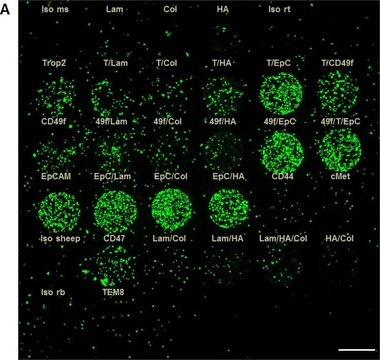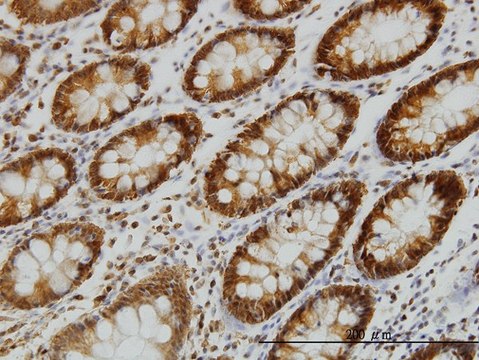SAB4200661
Monoclonal Anti-Dynamin 2 (DNM2) antibody produced in mouse
clone DYN2-11, purified from hybridoma cell culture
Synonyme(s) :
CMT2M, CMTDI1, CMTDIB, DI-CMTB, DYN2, DYNII, LCCS5, dynamin 2
About This Item
Produits recommandés
Source biologique
mouse
Niveau de qualité
Forme d'anticorps
purified immunoglobulin
Type de produit anticorps
primary antibodies
Clone
DYN2-11
Forme
buffered aqueous solution
Poids mol.
antigen ~98 kDa
Espèces réactives
mouse, human, monkey, canine, rat
Concentration
~1 mg/mL
Technique(s)
immunoblotting: 2-4 μg/mL using using whole extract of HeLa cells.
immunofluorescence: 5-10 μg/mL using using HeLa cells.
immunoprecipitation (IP): 5-10 μg using using whole extract of HeLa cells.
Isotype
IgG1
Numéro d'accès UniProt
Température de stockage
−20°C
Modification post-traductionnelle de la cible
unmodified
Informations sur le gène
human ... DNM2(1785)
mouse ... Dnm2(13430)
rat ... Dnm2(25751)
Description générale
Immunogène
Application
- immunoblotting
- immunoprecipitation
- immunofluorescence
Actions biochimiques/physiologiques
Forme physique
Clause de non-responsabilité
Vous ne trouvez pas le bon produit ?
Essayez notre Outil de sélection de produits.
Code de la classe de stockage
10 - Combustible liquids
Classe de danger pour l'eau (WGK)
WGK 1
Point d'éclair (°F)
Not applicable
Point d'éclair (°C)
Not applicable
Faites votre choix parmi les versions les plus récentes :
Certificats d'analyse (COA)
Vous ne trouvez pas la bonne version ?
Si vous avez besoin d'une version particulière, vous pouvez rechercher un certificat spécifique par le numéro de lot.
Déjà en possession de ce produit ?
Retrouvez la documentation relative aux produits que vous avez récemment achetés dans la Bibliothèque de documents.
Notre équipe de scientifiques dispose d'une expérience dans tous les secteurs de la recherche, notamment en sciences de la vie, science des matériaux, synthèse chimique, chromatographie, analyse et dans de nombreux autres domaines..
Contacter notre Service technique







